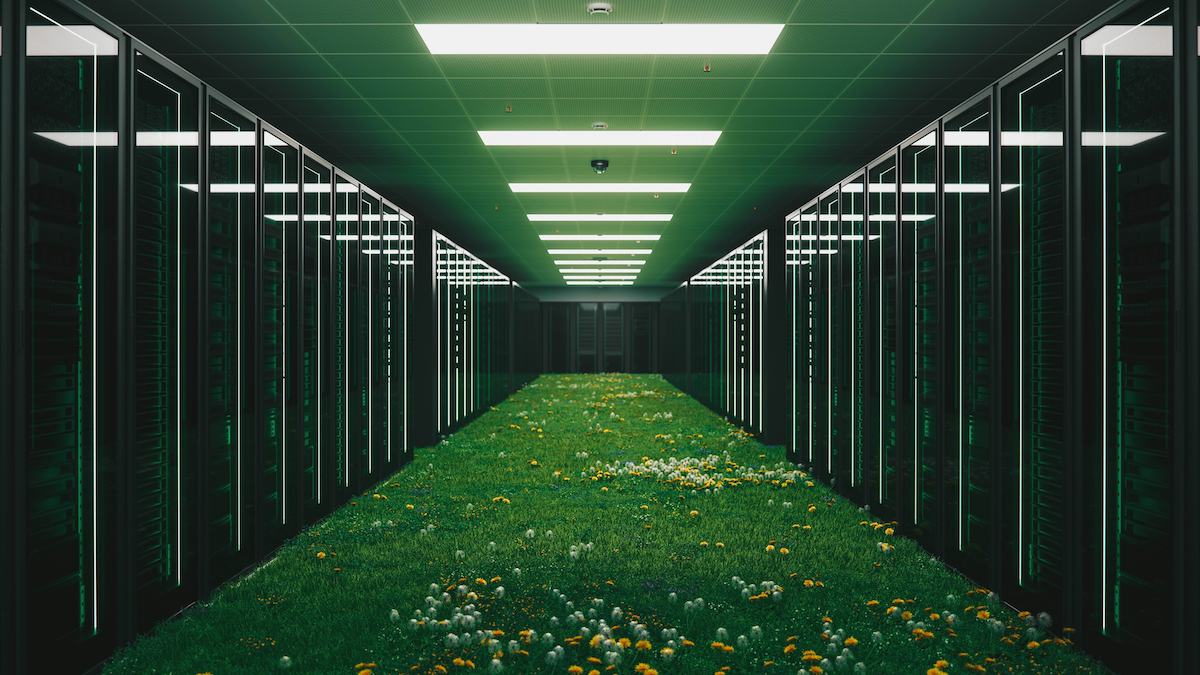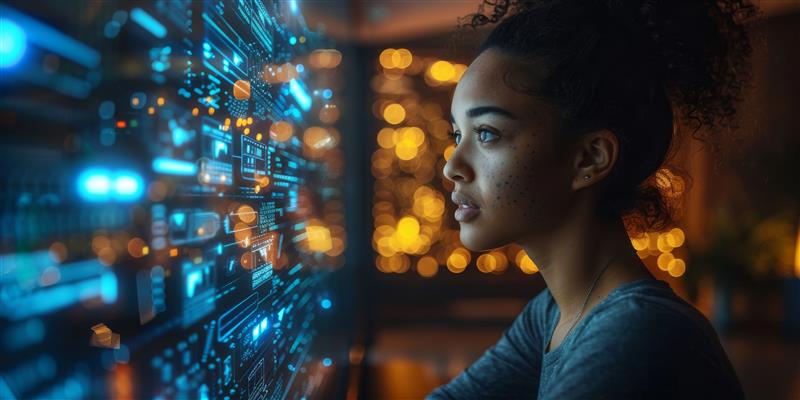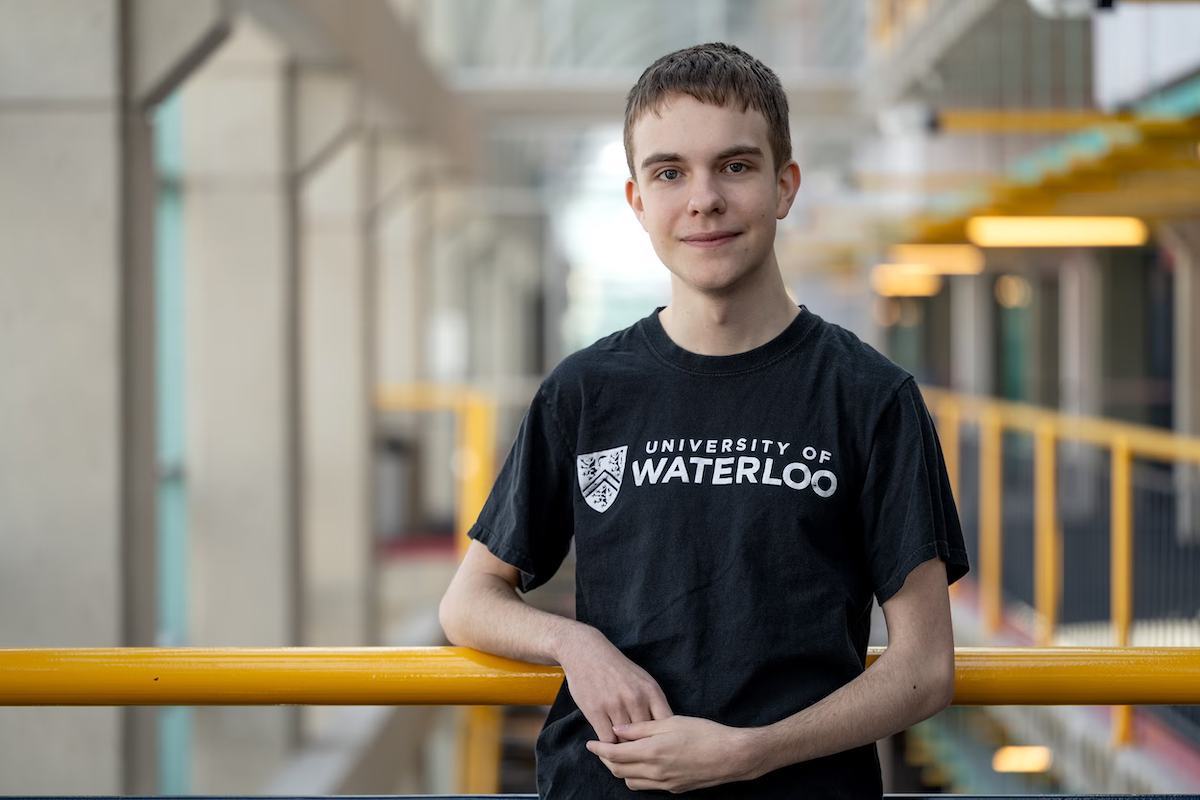Editor:
Brandon Sweet
University Communications
bulletin@uwaterloo.ca
Coding for a greener Internet

A news release from the Media Relations team.
Researchers from the University of Waterloo have found a way to reduce the energy use of some data centres by as much as 30 per cent.
Computing accounts for as much as 5 per cent of the world’s total energy use every day, and that type of energy consumption is expected to significantly increase as computing power is needed to meet the exponential growth of artificial intelligence. Nearly all web traffic is routed through data centres, the majority of which use the open-source operating system Linux.
“Information arrives at data centres in ‘packets,’ and then the data centre’s frontend, kind of like a receptionist at a front desk, figures out where to send those packets,” said Martin Karsten, professor of Computer Science in Waterloo's Faculty of Mathematics.
Karsten and his co-author, Computer Science grad student Peter Cai, realized that the way that data centres were processing network traffic was inefficient and devised a small change to make it far more efficient.
“We didn’t add anything,” Karsten said. “We just rearranged what is done when, which leads to a much better usage of the data centre’s CPU caches. It’s kind of like rearranging the pipeline at a manufacturing plant, so that you don’t have people running around all the time.”
Karsten teamed up with Joe Damato, distinguished engineer at Fastly, to develop a small section of code – approximately 30 lines – that would improve Linux’s network traffic processing. If adopted, the new method could reduce the energy consumption of important data centre operations by as much as 30 per cent, Karsten said.
They tested their solution’s effectiveness and submitted it to Linux for consideration. The code has been published this month as part of Linux’s newest kernel, release version 6.13.
“All these big companies – Amazon, Google, Meta – use Linux in some capacity, but they’re very picky about how they decide to use it,” Karsten said. “If they choose to ‘switch on’ our method in their data centres, it could save gigawatt hours of energy worldwide. Almost every single service request that happens on the Internet could be positively affected by this.”
Karsten points to this research, as well as the construction of a cutting-edge green computer server room in Waterloo’s upcoming Mathematics 4 building, as examples of the kind of sustainability research that computer scientists need to prioritize. “We all have a part to play in building a greener future,” he said.
The Linux kernel code addition developed by Karsten and Damato was based on research published in ACM SIGMETRICS Performance Evaluation Review.
Report recognizes the work of IST in 2024 and looks at what 2025 will bring

A message from Gregory Smith, Chief Information Officer.
I am pleased to announce IST's Annual Report. The report provides highlights of some of the important projects and initiatives IST staff have completed for the University community in 2024.
In partnership with local IT units throughout campus, IST aims to deliver an excellent and empowering IT experience for all, ensuring that our investments in technology help to fulfill teaching, learning, and research goals while supporting the efficient administration of the University. It is through those partnerships that we realize our shared success in IT, all while continuing to strengthen our collective approach to an ever-stronger cybersecurity posture and readiness.
On behalf of the IST Leadership team, thank you for reading the annual report. We are very proud of the work that IST staff have done and look forward to continuing to deliver on new initiatives in 2025 and beyond.
Computer science student receives outstanding undergraduate researcher award

This article was originally published on the Cheriton School of Computer Science.
Chris Trevisan, a fourth-year computer science student, is one of eight recipients — and the only recipient from a Canadian university — to receive the 2025 Computing Research Association Outstanding Undergraduate Researcher Award. The association’s top recognition honours exceptional undergraduate students from universities across North America who demonstrate outstanding research potential in the field of computing.
“Chris is a truly exceptional undergraduate researcher,” said Professor Gautam Kamath, one of two Cheriton School of Computer Science faculty members who supervised his research. “He independently solved a challenging mathematical research problem and authored a paper that was accepted at the 2024 Symposium on Discrete Algorithms, among the top conferences in algorithm design and discrete mathematics. His paper was the only one at SODA 2024 presented by a sole undergraduate author. Chris is the second person from Waterloo to ever win the top prize, joining Elyot Grant, who received the CRA Outstanding Undergraduate Researcher Award in 2010.”
Sponsored this year by Sandia National Laboratories and Lawrence Berkeley National Laboratory, the CRA Outstanding Undergraduate Researcher Award highlights the impact of groundbreaking work by undergraduate researchers.
Professor Sepehr Assadi, who also supervises Chris’s research, describes his experience working with him. “I got to know Chris when I attended his talk at SODA 2024 and I was blown away both by his superb presentation and the depth and breadth of his results,” said Professor Assadi. “I invited Chris to join a research project with me, working on a notoriously challenging open question in theoretical computer science and extremal graph theory. It has been a great pleasure working with Chris and I’m quite hopeful that with his outstanding technical and research skills we will be able to make significant progress on this longstanding open problem.”
More about Chris Trevisan’s SODA 2024 paper
Sorting and selection are fundamental problems in computer science. Given a list of numbers, either place them in order from least to greatest (sorting) or output the element that would be in the kth position of a sorted list (selection). Variations of the setting with certain modified constraints, however, cause the structure of the problem to change dramatically, resulting in much more interesting algorithmic problems.
For example, sorting and selection of numbers can be done under the adversarial comparator model, where comparisons can be adversarially tampered with. Usually, one can compare two numbers and learn which of the two elements is greater. But in the adversarial model, if the values of the two elements are close to one another, the comparison may give the incorrect answer. Another constraint one can consider is parallelism — in other words, how many rounds of adaptivity are needed to perform sorting or selection, sometimes called sorting and selection in rounds, which explores the trade-off between accuracy, number of comparisons, and number of rounds. If one can specify all the comparisons in advance, the algorithm is non-adaptive. Otherwise, if the comparisons that must be done depend on the results of previous comparisons the algorithm is adaptive.
Chris’s SODA paper resolves several classic open problems in the area, and provides a number of interesting new algorithms. Some of his main results are improved algorithms for adversarial sorting and selection, which show surprising gaps on the power of randomness for this problem. He also has more sophisticated results that additionally minimize the round complexity of the problem. Techniques range from careful structural and probabilistic analyses of text-book algorithms to more advanced techniques like sorting networks.
To learn more about the research that led to Chris receiving a 2025 CRA Outstanding Undergraduate Researcher Award, please read his paper, Sorting and Selection in Rounds with Adversarial Comparisons, presented at the 2024 Symposium on Discrete Algorithms (SODA).
Link of the day
Lincoln Alexander DayWhen and where
The Student Health Pharmacy (located in the lower level of the Student Life Centre) is now offering new COVID booster shots and flu shots. Call for appointments to register for the vaccination at 519-746-4500 or dial extension 33784. Walk-ins are welcome.
Warriors Game Day Tickets. Purchase your single game tickets or season packages today to cheer on your Warriors this season. Tickets on sale now for Basketball, Football, Hockey and Volleyball. Check out the schedules and purchase today!
Join the Disability Affinity Program mailing list to receive meeting information for the Disability Community Network and the Accessibility Ally Network.
Accessible transportation engagement session, Tuesday, January 21, 11:00 a.m. to 1:00 p.m., Student Life Centre, Black & Gold room (elevator available).
Master of Taxation Virtual Information Session, Tuesday, January 21, 4:00 p.m.
Noon Hour Concert: Musical Reflections on the Holocaust, Wednesday, January 22, 12 noon, Conrad Grebel Chapel. Free admission.
Sustainable Transportation Plan Open House, Wednesday, January 22, 1:00 p.m. to 3:00 p.m., Davis Centre foyer (near library and Tim Horton's).
Staff Association office hours, Thursday, January 23, 11:30 a.m. to 1:00 p.m., DC 3608.
WaterTalk featuring Dr. Daniel Jaffee, Professor of Sociology, Portland State University, “Unbottled: Plastic Water, Inequality, and Water Justice,” Thursday, January 23, 12 noon to 1:00 p.m., Zoom.
Chemical Engineering Graduate Studies Fair, Friday, January 24, 3:30 p.m. to 5:30 p.m., E7 1st Floor Ideas Clinic.
Warriors Volleyball vs. Toronto, Saturday, January 25, (W) 2:00 p.m., (M) 4:00 p.m., Carl Totzke Court, PAC. Think Pink, Camps and Minor League Night. Buy your tickets today!
Warriors Women’s Hockey vs. Guelph, Sunday, January 26, 2:30 p.m., CIF Arena. Think Pink, Camps and Minor League Day, Alumni Day. Buy your tickets today!
WISE Public Lecture, “Six Nations participation in the energy transition” by Matt Jamieson, CEO, Six Nations of the Grand River Development Corporation (SNGRDC)., Monday, January 27, 1:30 p.m. to 2:30 p.m., Engineering (E7), Faculty Hall (E7-7303/7363)., In-person and on Zoom. Register today!
NEW - FAUW Equity and Inclusivity Award presentation, Tuesday, January 28, 11:00 a.m., Engineering 7 2nd floor.
Physical Vapour Deposition (PVD) Introductory Seminar, Wednesday, January 29, 10:00 a.m., to 2:00 p.m., QNC 0101.
Fentanyl: a harm reduction forum, Wednesday, January 29, 10:30 a.m. to 12 noon, Enterprise Theatre, EC5 and online via Zoom.
Noon Hour Concert: Low Pair, Wednesday, January 29, 12 noon, Conrad Grebel Chapel. Free admission.
Transitional Justice and Human Rights: A Dialogue between Colombia and Canada, Wednesday, January 29, 12:20 p.m. to 2:20 p.m., Alumni Hall, United College.
Accessible transportation engagement session, Wednesday, January 29, 1:30 p.m. to 3:30 p.m., Student Life Centre, Black & Gold room (elevator available).
Yintah: Wet’suwet’en women leading the defence of dignity, territory and rights (documentary and conversation), Wednesday, January 29, 5:30 p.m. to 8:30 p.m., Alumni Hall, United College.
Warriors Basketball vs. Western, Wednesday, January 29, (W) 6:00 p.m., (M) 8:00 p.m., Carl Totzke Court, PAC. Think Pink, Domino's 3s for Cheese, Residence Night, Three Point Thrills, Lou's Residence Cookie Giveaway. Buy your tickets today!
Sustainable Transportation Plan Open House, Thursday, January 30, 11:00 a.m. to 1:00 p.m., SLC Marketplace.
University of Waterloo Knowledge Mobilization Community of Practice, “Adventures in Knowledge Mobilization for Global Impact: Examples from the International Tobacco Control Policy Evaluation Project (the ITC Project),” with Dr. Geoffrey Fong, Thursday, January 30, 10:00 a.m. to 11:30 a.m. Contact Nadine Quehl to request a Teams invitation or for more information.
NEW - WIN and Electrical and Computer Engineering Seminar with Benoît Lessard and speaker Hany Aziz, "“Green” Electronics: from Sustainable Materials to Cannabinoid Sensors," Thursday, January 30, 11:30 a.m., QNC 1501
Upcoming service interruptions
Stay up to date on service interruptions, campus construction, and other operational changes on the Plant Operations website. Upcoming service interruptions include:
-
Optometry corridors 2012 and 1009 closure for demo and renovation, Thursday, January 16 to January 22, alternate stairs need to be taken to move from 2nd to 3rd floor, both washrooms on the 2nd floor will be inaccessible for the week.
-
Douglas Wright Engineering Building (DWE) electrical shutdown, Tuesday, January 21, 6:00 a.m. to 7:30 a.m., 120/208-volt non-essential power will be offline for approximately 1.5 hours to remove wiring from light fixtures and rework. Receptacles, wiremolds, and lights will be offline during the duration of the shutdown. Emergency lighting will remain operational.
-
UW Daycare (Bright Starts), Toby Jenkins Building, Optometry, Columbia Ice Field fire alarm testing, Wednesday, January 22, 6:30 a.m. to 8:15 a.m.
-
East Campus Hall, Engineering 5, 6 and 7 fire alarm testing, Friday, January 24, 6:30 a.m. to 8:15 a.m.
-
Main Path directly north of Biology 1 crane operation, Friday, January 24, 7:00 a.m. to 12 noon, there will be a partial closure of the main path. Pedestrian access will still be available.
-
Wilmot South, Wellesley South, Eby Hall, Claudette Miller Hall fire alarm testing, Friday, January 24, 1:00 p.m. to 2:30 p.m.
-
Science Teaching Complex ventilation shutdown, Saturday, January 25, 7:00 a.m. for 10 hours, make-up air to fume hoods will be off.
-
Optometry building heat shutdown, Saturday, January 25, February 1 and 2 from 6:30 a.m. to 4:30 p.m., full building heat shutdown for HVAC equipment work. There will be no access to the Witer Learning Resource Centre, the pre-clinic or the simulation lab on those days. However, the building will remain open with electricity and water still available.
-
Quantum Nano Centre, Biology 1 & 2, Health Services, Science Teaching Centre fire alarm testing, Monday, January 27, 6:30 a.m. to 8:15 a.m.
-
DWE building domestic hot water shutdown, Monday, January 27, 7:00 a.m. to 3:00 p.m., and Tuesday, January 28 (backup day), no hot water available while meters are installed.
-
Dana Porter Library hot water shutdown, Tuesday, January 28, 7:00 a.m. to 3:00 p.m., no hot water available while meters are installed.
-
Biology 1 steam outages, Tuesday, January 28, 7:30 a.m. to 2:30 p.m., localized steam outage affecting the 2nd floor AHU to accommodate steam trap replacements. Heating will be affected on the 2nd floor only.
-
CPH building domestic hot water shutdown, Tuesday, January 28, 7:00 a.m. to 3:00 p.m., no hot water available during meter installation.
-
RCH building domestic hot water shutdown, Wednesday, January 29, 7:00 a.m. to 3:00 p.m., no hot water available while meters are installed.
-
Central Services Building domestic hot water shutdown, Thursday, January 30, 7:00 a.m. to 3:00 p.m. and January 31 (backup day), no hot water available during meter installation.